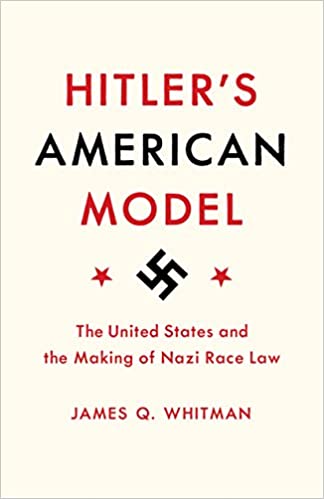Whitman, James Q.. Hitler’s American Model: The United States and the Making of Nazi Race Law. Princeton. 2017. Princeton University Press. 9780691172422. 208 pages. hardcover. Cover design by Faceout Studio, Charkes Brock.
 FROM THE PUBLISHER -
FROM THE PUBLISHER -
Nazism triumphed in Germany during the high era of Jim Crow laws in the United States. Did the American regime of racial oppression in any way inspire the Nazis? The unsettling answer is yes. In Hitler's American Model, James Whitman presents a detailed investigation of the American impact on the notorious Nuremberg Laws, the centerpiece anti-Jewish legislation of the Nazi regime. Contrary to those who have insisted that there was no meaningful connection between American and German racial repression, Whitman demonstrates that the Nazis took a real, sustained, significant, and revealing interest in American race policies. As Whitman shows, the Nuremberg Laws were crafted in an atmosphere of considerable attention to the precedents American race laws had to offer. German praise for American practices, already found in Hitler's Mein Kampf, was continuous throughout the early 1930s, and the most radical Nazi lawyers were eager advocates of the use of American models. But while Jim Crow segregation was one aspect of American law that appealed to Nazi radicals, it was not the most consequential one. Rather, both American citizenship and antimiscegenation laws proved directly relevant to the two principal Nuremberg Laws?the Citizenship Law and the Blood Law. Whitman looks at the ultimate, ugly irony that when Nazis rejected American practices, it was sometimes not because they found them too enlightened, but too harsh. Indelibly linking American race laws to the shaping of Nazi policies in Germany, Hitler's American Model upends understandings of America's influence on racist practices in the wider world.
 James Q. Whitman is the Ford Foundation Professor of Comparative and Foreign Law at Yale Law School. He earned his B.A. and J.D. from Yale University and Law School and also holds an M.A. in European History from Columbia University and a Ph.D. in Intellectual History from the University of Chicago. From 1988-1989, Professor Whitman clerked for the Hon. Ralph K. Winter of the Second Circuit Court of Appeals, then began his teaching career at Stanford University Law School. He has taught as a visiting professor at universities in France and Italy and has been a professor at Yale Law School since 1994. In 1996 he became the Ford Foundation Professor of Comparative and Foreign Law. Professor Whitman's many articles have been published internationally and across disciplines. He has also been awarded numerous prizes and fellowships throughout his career. In 2008 he published The Origins of Reasonable Doubt: Theological Roots of the Criminal Trial, which received an honorable mention, Silver Gavel Award, American Bar Association, 2009. His book The Verdict of Battle: The Law of Victory and the Making of Modern War appeared in 2012. He was a John Simon Guggenheim Fellow in 2010-2011. His other scholarship includes an article, "The Two Western Cultures of Privacy: Dignity versus Liberty" published in the 2004 volume of The Yale Law Journal. His 2003 book, Harsh Justice: Criminal Punishment and the Widening Divide Between America and Europe, published by the Oxford University Press, won the 2004 Distinguished Book Award of the Division of International Criminology of the American Society of Criminology.
James Q. Whitman is the Ford Foundation Professor of Comparative and Foreign Law at Yale Law School. He earned his B.A. and J.D. from Yale University and Law School and also holds an M.A. in European History from Columbia University and a Ph.D. in Intellectual History from the University of Chicago. From 1988-1989, Professor Whitman clerked for the Hon. Ralph K. Winter of the Second Circuit Court of Appeals, then began his teaching career at Stanford University Law School. He has taught as a visiting professor at universities in France and Italy and has been a professor at Yale Law School since 1994. In 1996 he became the Ford Foundation Professor of Comparative and Foreign Law. Professor Whitman's many articles have been published internationally and across disciplines. He has also been awarded numerous prizes and fellowships throughout his career. In 2008 he published The Origins of Reasonable Doubt: Theological Roots of the Criminal Trial, which received an honorable mention, Silver Gavel Award, American Bar Association, 2009. His book The Verdict of Battle: The Law of Victory and the Making of Modern War appeared in 2012. He was a John Simon Guggenheim Fellow in 2010-2011. His other scholarship includes an article, "The Two Western Cultures of Privacy: Dignity versus Liberty" published in the 2004 volume of The Yale Law Journal. His 2003 book, Harsh Justice: Criminal Punishment and the Widening Divide Between America and Europe, published by the Oxford University Press, won the 2004 Distinguished Book Award of the Division of International Criminology of the American Society of Criminology.